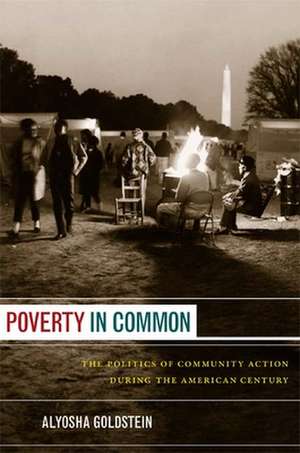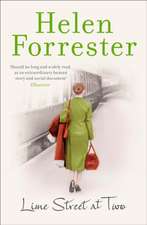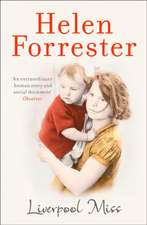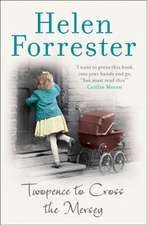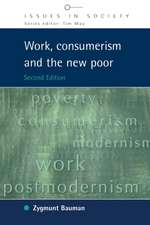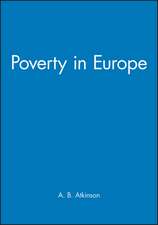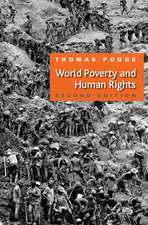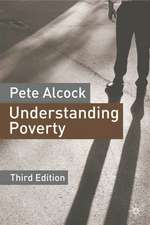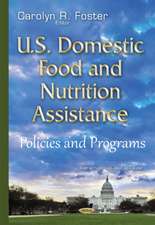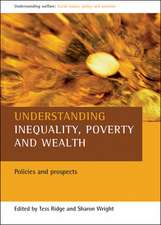Poverty in Common – The Politics of Community Action during the American Century
Autor Alyosha Goldsteinen Limba Engleză Paperback – 22 mar 2012
Preț: 302.96 lei
Nou
Puncte Express: 454
Preț estimativ în valută:
57.97€ • 60.65$ • 48.16£
57.97€ • 60.65$ • 48.16£
Carte tipărită la comandă
Livrare economică 02-16 aprilie
Preluare comenzi: 021 569.72.76
Specificații
ISBN-13: 9780822351818
ISBN-10: 0822351811
Pagini: 392
Ilustrații: 17 illustrations
Dimensiuni: 156 x 234 x 26 mm
Greutate: 0.54 kg
Editura: MD – Duke University Press
ISBN-10: 0822351811
Pagini: 392
Ilustrații: 17 illustrations
Dimensiuni: 156 x 234 x 26 mm
Greutate: 0.54 kg
Editura: MD – Duke University Press
Recenzii
Poverty in Common is an insightful analysis of how community development figured in liberal reformist and nation building programs in the United States during the 1950s and 1960s. As Alyosha Goldstein argues so convincingly, liberals depended on assertions of community participation and even required that oppressed populations be made to participate in a reformist agenda. Yet liberals circumscribed that participation by pushing aside pressing questions about structural inequality, entrenched racism, and the redistribution of resources. Poverty in Common offers a compelling way to think about the powerful appeal and ultimate demise of postwar American liberalism. Michael Latham, author of The Right Kind of Revolution: Modernization, Development, and U.S. Foreign Policy from the Cold War to the Present"Poverty in Common challenges us to think anew about the meaning of community action in twentieth-century liberal reform politics. Alyosha Goldstein builds on wide-ranging historical research to uncover the deep-seated tensions that defined community-based antipoverty programs from the start, and to document what happened when officially sanctioned strategies of civic order and social incorporation came up against locally mobilized strategies of political disruption aimed at challenging the social and economic status quo. This is a history more of struggle and stalemate than of triumph and defeat. In Goldstein's able hands, it is vital and illuminating."Alice O'Connor, author of Poverty Knowledge"Poverty in Common is a highly original and nuanced study of how 'the government of poverty' at home and abroad became central to postwar US liberalism and its distinctive precipitates of violence and reform, force and freedom, democracy and empire."Nikhil Pal Singh, author of Black Is a Country
"Poverty in Common is an insightful analysis of how community development figured in liberal reformist and nation building programs in the United States during the 1950s and 1960s. As Alyosha Goldstein argues so convincingly, liberals depended on assertions of community participation and even required that oppressed populations be made to participate in a reformist agenda. Yet liberals circumscribed that participation by pushing aside pressing questions about structural inequality, entrenched racism, and the redistribution of resources. Poverty in Common offers a compelling way to think about the powerful appeal and ultimate demise of postwar American liberalism." Michael Latham, author of The Right Kind of Revolution: Modernization, Development, and U.S. Foreign Policy from the Cold War to the Present "Poverty in Common challenges us to think anew about the meaning of community action in twentieth-century liberal reform politics. Alyosha Goldstein builds on wide-ranging historical research to uncover the deep-seated tensions that defined community-based antipoverty programs from the start, and to document what happened when officially sanctioned strategies of civic order and social incorporation came up against locally mobilized strategies of political disruption aimed at challenging the social and economic status quo. This is a history more of struggle and stalemate than of triumph and defeat. In Goldstein's able hands, it is vital and illuminating." - Alice O'Connor, author of Poverty Knowledge "Poverty in Common is a highly original and nuanced study of how 'the government of poverty' at home and abroad became central to postwar US liberalism and its distinctive precipitates of violence and reform, force and freedom, democracy and empire." - Nikhil Pal Singh, author of Black Is a Country
"Poverty in Common is an insightful analysis of how community development figured in liberal reformist and nation building programs in the United States during the 1950s and 1960s. As Alyosha Goldstein argues so convincingly, liberals depended on assertions of community participation and even required that oppressed populations be made to participate in a reformist agenda. Yet liberals circumscribed that participation by pushing aside pressing questions about structural inequality, entrenched racism, and the redistribution of resources. Poverty in Common offers a compelling way to think about the powerful appeal and ultimate demise of postwar American liberalism." Michael Latham, author of The Right Kind of Revolution: Modernization, Development, and U.S. Foreign Policy from the Cold War to the Present "Poverty in Common challenges us to think anew about the meaning of community action in twentieth-century liberal reform politics. Alyosha Goldstein builds on wide-ranging historical research to uncover the deep-seated tensions that defined community-based antipoverty programs from the start, and to document what happened when officially sanctioned strategies of civic order and social incorporation came up against locally mobilized strategies of political disruption aimed at challenging the social and economic status quo. This is a history more of struggle and stalemate than of triumph and defeat. In Goldstein's able hands, it is vital and illuminating." - Alice O'Connor, author of Poverty Knowledge "Poverty in Common is a highly original and nuanced study of how 'the government of poverty' at home and abroad became central to postwar US liberalism and its distinctive precipitates of violence and reform, force and freedom, democracy and empire." - Nikhil Pal Singh, author of Black Is a Country
Notă biografică
Cuprins
Acknowledgments ix
Introduction: "Now, We're Our Own Government" 1
1. Freedom Between: Inequality and the Democracy of "Felt Needs" 31
2. On the Internal Border: Colonial Difference and the Locations of Underdevelopment 77
3. The Civics and Civilities of Poverty: Participation, Policing, and the Poor People's Campaign 111
4. The Surplus of Inclusion: Poverty, Pluralism, and the Politics of Community 155
5. Thresholds of Opposition: Liberty, Liberation, and the Horizon of Incrimination 199
Conclusion. A Peculiar Freedom: Community and Poverty, from New Federalism to Neoliberalism 245
Notes 257
Bibliography 323
Index 357
Introduction: "Now, We're Our Own Government" 1
1. Freedom Between: Inequality and the Democracy of "Felt Needs" 31
2. On the Internal Border: Colonial Difference and the Locations of Underdevelopment 77
3. The Civics and Civilities of Poverty: Participation, Policing, and the Poor People's Campaign 111
4. The Surplus of Inclusion: Poverty, Pluralism, and the Politics of Community 155
5. Thresholds of Opposition: Liberty, Liberation, and the Horizon of Incrimination 199
Conclusion. A Peculiar Freedom: Community and Poverty, from New Federalism to Neoliberalism 245
Notes 257
Bibliography 323
Index 357
Descriere
This work looks at inter-related post WWII case studies to analyze the ways in which different groups, mostly governmental agencies and emerging activist organizations, invoked the idea of "community" in anti-poverty initiatives during the late 1950s and 1960s.
